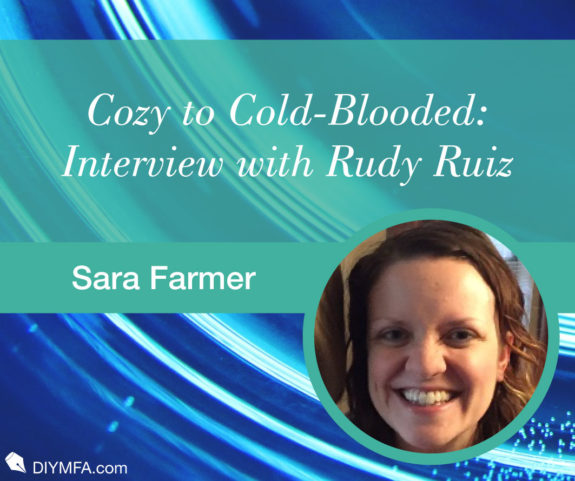Hello, mystery enthusiasts! Today I have something a little different to share with you, an interview with the wonderful author Rudy Ruiz about his latest novel Valley of Shadows.
About Rudy Ruiz
Rudy Ruiz is an American author, advocate, and social entrepreneur. The son and grandson of Mexican immigrants, Rudy Ruiz was born in Brownsville, Texas and raised along the US-Mexico border, living in Matamoros, Mexico for extensive periods of time.
He did not speak English until he entered school at the age of five. Once in school, he excelled and dreamt of growing up to be a writer, an entrepreneur, and a contributor to the wellbeing of immigrants and minorities, as well as to positive relations between diverse cultures and nations.
He earned his Bachelor’s and Master’s degrees at Harvard. Ruiz now resides in San Antonio with his wife, Heather, and their two children, Paloma and Lorenzo.
You can find Rudy on his website, and follow him on Twitter.
About Valley of Shadows
Solitario Cisneros thought his life was over long ago. He lost his wife, his family, even his country in the late 1870s when the Rio Grande shifted course, stranding the Mexican town of Olvido on the Texas side of the border. He’d made his brooding peace with retiring his gun and badge, hiding out on his ranch, and communing with horses and ghosts. But when a gruesome string of murders and kidnappings ravages the town, pushing its volatile mix of Anglo, Mexican, and Apache settlers to the brink of self-destruction, he feels reluctantly compelled to confront both life, and the much more likely possibility of death, yet again.
As Solitario struggles to overcome not only the evil forces that threaten the town but also his own inner demons, he finds an unlikely source of inspiration and support in Onawa, a gifted and enchanting Apache-Mexican seer who champions his cause, daring him to open his heart and question his destiny.
As we follow Solitario and Onawa into the desert, we join them in facing haunting questions about the human condition that are as relevant today as they were back then: Can we rewrite our own history and shape our own future? What does it mean to belong to a place, or for a place to belong to a people? And, as lonely and defeated as we might feel, are we ever truly alone?
Interview with Rudy Ruiz
Sara Farmer: How do you decide how much Spanish to put in the book? (I’ve been working on my Spanish and was proud I understood most of it!)
Rudy Ruiz: Weaving Spanish into the fabric of my stories has always come very instinctively to me as I write. I feel that the Spanish words or phrases bubble forth from the characters and I decide to keep them in Spanish rather than translating them into English if they have a particular cultural resonance, if they convey a unique emotion, sentiment, or verbal tradition. Or, if they accentuate a particular relationship or dynamic. I also like to use Spanish words that might be familiar to non-Spanish speakers or very similar to their English counterparts. Using this approach, along with always putting Spanish words in context, helps me ensure that a non-Spanish reader will still get the gist of what is being said, which is very important to me as a writer who respects his readers and wants them to stay engaged with the characters and their stories.
SF: This book checked so many of my boxes – Mexico/Texas history, Gothic, some magical realism, mystery. How did you come up with this story? Are any of the characters/events based on real life? Is Olvido a real town?
RR: So many sources of inspiration merged to motivate me to create this setting, characters and story.
For starters, my son asked me to write a Western horror story. This was an interesting challenge to me. I’ve written quite a bit of magical realism, but never ventured into these two genres. That said, I come from a family with a history of ranching and grew up around cattle and horses, watching classic Westerns and Mexican charro movies with my father. I thought it would be amazing to take all that inspiration and apply my voice and my style of magical realism to it, and create a new type of American hero that turned the Western genre on its head: A Mexican-American lawman paired with heroic Mexican and Native American partners. It was way more immersive and exciting than I could have imagined.
Researching the history of the era, I was also driven by some of the oft-ignored social injustices and atrocities inflicted upon the Native American and Mexican-American inhabitants of the Southwest. In particular, the tragedy of the Porvenir Massacre of 1918, an event forgotten for a century after Texas Rangers executed 15 Mexican and Mexican-American boys and men for unproven allegations of cattle rustling, motivated me to shed light on the troubled history of Texas and the border, and imagine an alternate reality in which the presence of diverse leaders and heroes makes a difference in saving lives and achieving justice for all.
Lastly, creating Olvido, a mythical border town along the frontier of West Texas and Chihuahua, Mexico was a dream as a writer. In my previous book, The Resurrection of Fulgencio Ramirez, I set the novel in a mythical border town based on my own birthplace, calling it La Frontera. This is likewise the birthplace of Solitario Cisneros, the protagonist in Valley of Shadows. But Olvido is a dusty, forgotten town on the edge of nowhere, where Solitario has unsuccessfully attempted to elude the family curse that haunts him. Olvido turned out to be a magical place that grew into a character of its own. I was delighted that Blackstone Publishing even helped turn my rudimentary sketches of the town and its layout into beautiful, antique-style maps. I hope readers can really lose themselves in this magical and remote place and connect with the characters and their lives.
SF: Did any authors inspire you in the writing of this book?
RR: I looked to Gabriel García Márquez and Laura Esquivel for the magic and cultural depth, William Faulkner for the Southern Gothic flare, and Cormac McCarthy for the grit, solitude, and sparse aesthetic of cowboy life in West Texas.
SF: You delved deeply into a brief pocket of time in a small place in a very particular era. And yet, the story has an epic feel due to the time period, the setting, and the stakes. Not to mention the emotions driving it all. How did you produce this blend of intimate and epic?
RR: I’d like to think that is magic, part of the intangible creative process. But, truth be told, what helped make this formula work was starting out with archetypes yet being determined to explore and subvert those archetypes. For example, the classic Western sheriff is a monumental American hero. Putting a Mexican-American widower who is grieving, cursed and lonely in that role turns the Western on its head. Fighting against stereotypes helps render complex and nuanced characters that feel authentic and real. This is what I aimed for in Solitario, Onawa, Elias, and other key characters in the novel, to make them more than what would be expected of a traditional tale. In doing that, I think I hopefully portray them as multifaceted human beings with universally relatable emotions. So regardless of who they are, or where they come from, my wish is that any reader can connect to them, feel their pains and their aspirations, and root for them. In the end, yes it’s a sweeping saga in an epic setting and a classic time, but it’s more importantly a story about imperfect people struggling to come out of the shadows of grief, loss, personal tragedy, isolation, and injustice and reaching for help from each other to find healing and hope in a rather inhospitable environment.
SF: Finally, the question I ask all of my interviewees – Do you have drawer novels?
RR: Do I! I have several manuscripts ready to go. These include a border Bildungsroman based on my own coming of age on the border, a novel about an extended family of undocumented immigrants pursuing the American Dream in Los Angeles, a magical realism family saga set during the days of the Mexican Revolution, a post-apocalyptic sci-fi thriller about a trio of resourceful librarians striving to save the last books on the planet, and a couple of sequel concepts for Valley of Shadows. I can’t wait to see what gets the green light next!
If you decide to check out the book, we hope you’ll do so via this Amazon affiliate link, where if you choose to purchase via the link DIY MFA gets a referral fee at no cost to you. As always, thank you for supporting DIY MFA!

Sara Farmer lives in Austin, TX, with her husband, three kids, and two cats. When she’s not chasing kids and cats, she reads and writes mysteries. You can find her at www.kittymomma.com and on Twitter @avonlea79.







